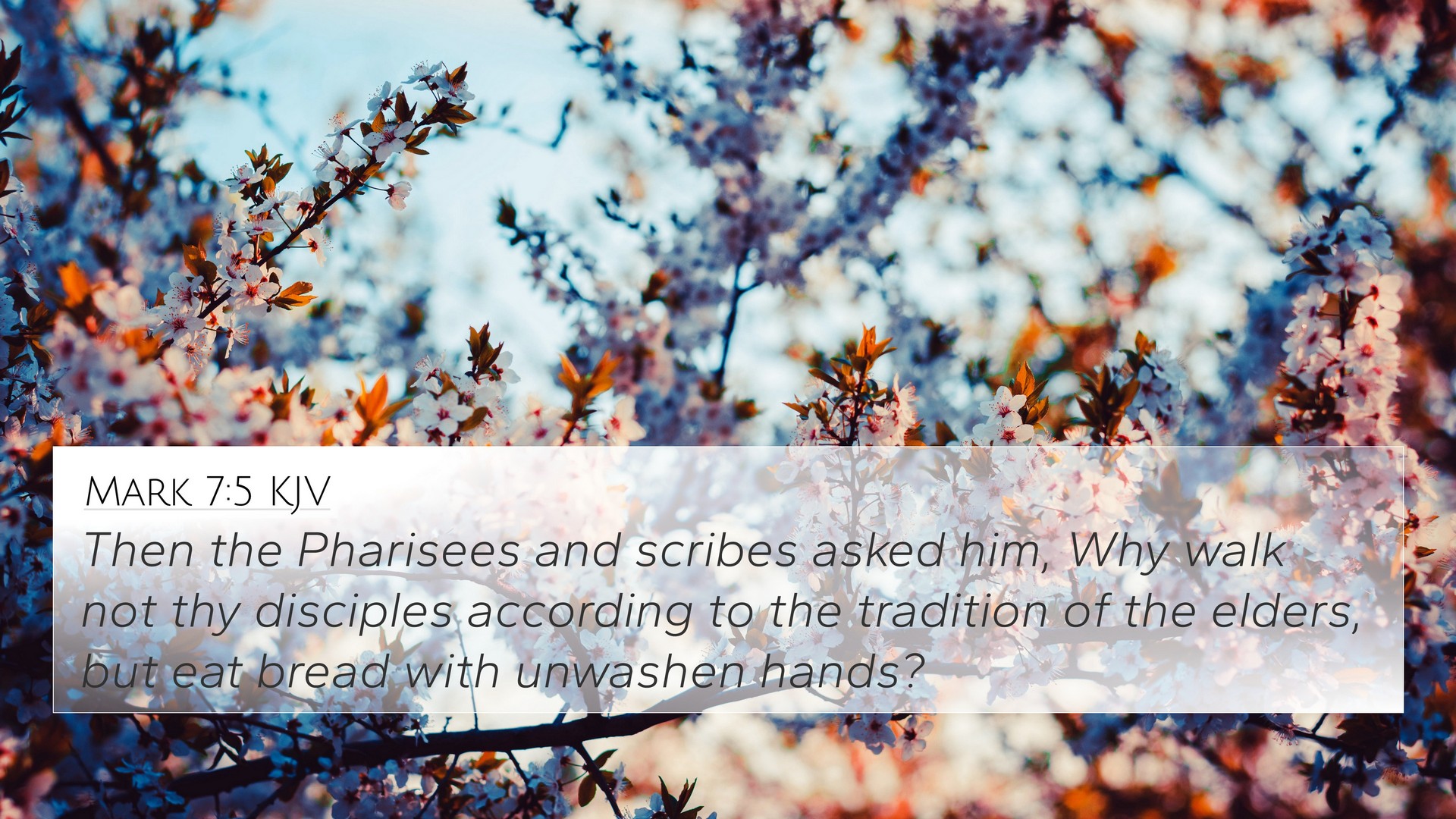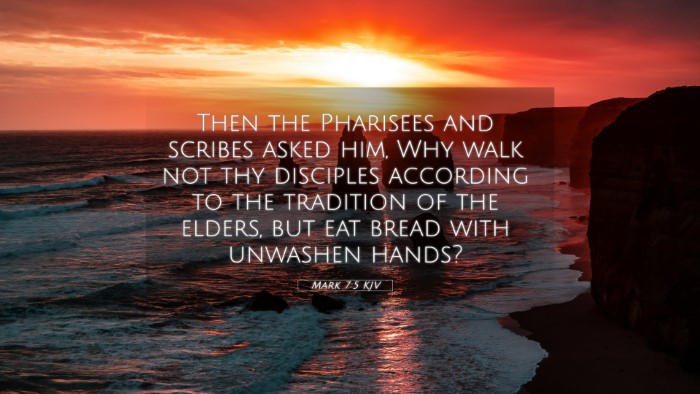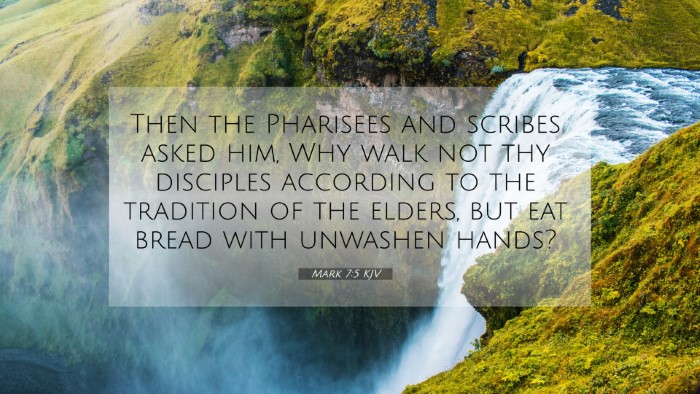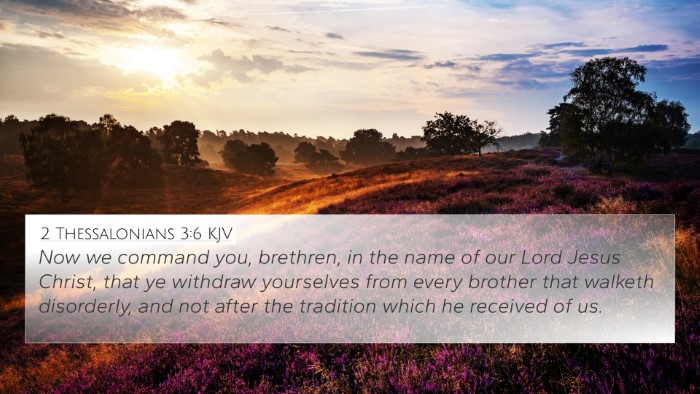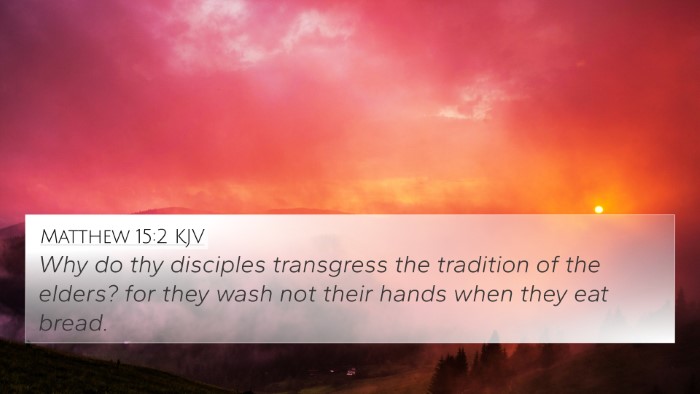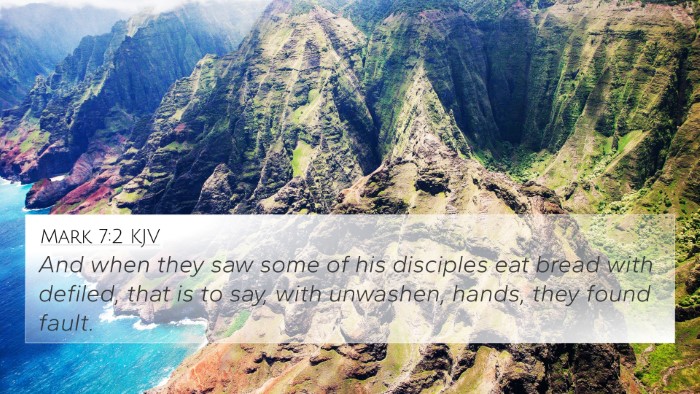Understanding Mark 7:5
The verse Mark 7:5 states:
"Then the Pharisees and scribes asked Him, 'Why do Your disciples not walk according to the tradition of the elders, but eat bread with unwashed hands?'"
Verse Meaning and Context
This verse captures a pivotal moment in the ministry of Jesus, where the religious leaders question Him about the practices of His disciples. It reflects the tension between tradition and the teachings of Christ.
Key Themes
- Tradition vs. Commandment: The Pharisees emphasize adherence to their traditions rather than the commandments of God.
- Ritual Purity: The act of washing hands is symbolic of a broader concern for ritual cleanliness.
- Authority of Christ: Jesus challenges the religious authorities' interpretations of the Law.
Commentary Insights
Insights from various public domain commentaries provide a deeper understanding of the motivations and implications of this verse.
Matthew Henry
Matthew Henry emphasizes that the Pharisees were more concerned with ritual than with moral integrity. Their question reveals a misunderstanding of the purpose of God's laws and traditions, which are intended to lead the people closer to God, rather than be mere rules to uphold.
Albert Barnes
Albert Barnes notes that the 'tradition of the elders' refers to a body of rules handed down orally, which had far surpassed the original intent of the Mosaic Law. He argues that these traditions had become burdensome and were prioritized over the true commandments, highlighting the danger of missing the heart of God's Word.
Adam Clarke
Adam Clarke elaborates on the concept of cleanliness and ritual practices, suggesting that the while physical cleanliness was important, Jesus was more concerned about a person's spiritual state and adherence to the spirit of the law rather than the letter of it.
Bible Cross-References
This verse is linked to several other Biblical texts that highlight similar themes. Here are some notable cross-references:
- Isaiah 29:13: "The Lord says: 'These people come near to me with their mouth and honor me with their lips, but their hearts are far from me.'" This illustrates the disconnect between outward actions and inner devotion.
- Matthew 15:2: "Why do Your disciples transgress the tradition of the elders? For they do not wash their hands when they eat bread." This is a parallel moment where Jesus' authority is challenged.
- Colossians 2:8: "Beware lest anyone cheat you through philosophy and empty deceit, according to the tradition of men..." This warns against valuing human traditions over divine truth.
- 1 Peter 1:15-16: "But as He who called you is holy, you also be holy in all your conduct." This speaks to the importance of internal purity over external rituals.
- Mark 12:29-31: Highlights the importance of loving God and one's neighbor over adherence to human-made traditions.
- Romans 10:4: "For Christ is the end of the law for righteousness to everyone who believes." This suggests that fulfillment in Christ transcends traditional adherence.
- James 1:27: "Pure and undefiled religion before God and the Father is this: to visit orphans and widows in their trouble..." This shifts focus from rituals to acts of love and mercy.
Connecting to Broader Themes
Mark 7:5 invites readers to explore the connections between Biblical verses regarding tradition, purity, and the heart of God’s commandments. The thematic connections found in these scriptures provide insights into the nature of faith beyond ritualistic practices.
Scriptural Cross-Referencing Methods
To engage further in understanding Bible verses and their interrelations, consider the following tools:
- Bible Concordance: Look up keywords and find verses that relate thematically.
- Cross-Reference Bible Study: Use commentaries that focus on linking verses together.
- Bible Reference Resources: Employ studies that compile verses on particular topics or themes.
Conclusion
Mark 7:5 serves as a poignant reminder of the need to prioritize the spirit of the law over mere traditional observance. As we study this verse in context with others, we develop a richer understanding of the implications of Jesus’ teachings and the call to authentic faith.
Further Study
For those interested in how to find cross-references and explore more about the interconnections in scripture, exploring the methods mentioned will facilitate a deeper engagement with the text. The exploration of these connections can enhance personal Bible study and sermon preparation, ensuring a holistic understanding of biblical themes.
